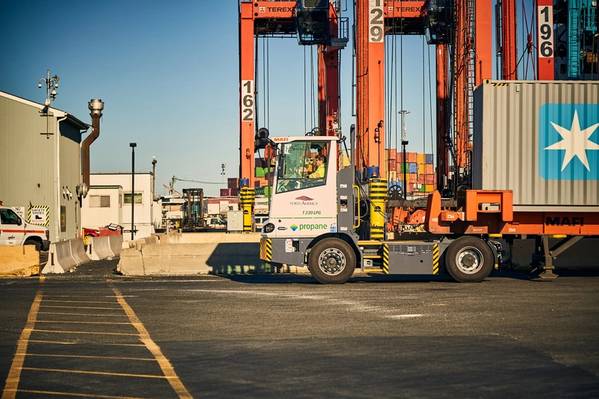
As emissions regulations across the country get stricter, port authorities can take advantage of more than $650 million in funding from the U.S. Department of Transportation Maritime Administration (MARAD). Grant dollars from the Port Infrastructure Development Program (PIDP) can be used for projects that include environmental and emissions mitigation measures and terminal equipment upgrades.
Eligible projects include cargo handling equipment (CHE) purchases, such as propane yard tractors and related infrastructure, as well as operational improvements.
“The demand for clean and reliable power in ports continues to increase, but the availability of infrastructure is slowing clean energy efforts,” said Tucker Perkins, president and CEO of the Propane Education & Research Council (PERC). “Propane is a viable solution because it is a clean alternative energy source that is readily available to both charge electric vehicles and power other applications in ports.”
Many port authorities and terminal operators are starting down the path to decarbonization by upgrading their diesel equipment with alternatives like propane- and electric-powered CHE. Propane-powered terminal tractors cost significantly less than electric units and have readily available refueling infrastructure. Plus, during real-world testing, propane-powered terminal tractors proved to be 99 percent cleaner than diesel counterparts without any drop-off in payload or power.
Electric vehicle infrastructure availability and cost are two major roadblocks facing port authorities. Fortunately, mobile charging units and microgrids are also eligible for funding. Propane-powered mobile charging units are a cost-effective and low-emissions strategy to provide immediate clean energy power to on road vehicles, reach stackers, top handlers, forklifts, terminal tractors, and more.
With power generation technology advancements, port authorities can purchase powerful mobile charging infrastructure for vehicle classes 1-8, ranging from 90 to 400kW. These units are powered by propane generators, which are approximately 98 percent cleaner than diesel variations.
“Mobile charging units are a strong investment for terminal operators and businesses alike because you can take them where you need,” said Perkins. “You’re not stuck in one place, so fleets and infrastructure can evolve with the business.”
Additionally, installation of microgrids provides port authorities autonomy and resiliency. Microgrids are controlled energy grids that can disconnect from the larger electric grid and operate independently, producing power with a combination of propane generation equipment and renewable sources like wind and solar. By combining ultra-low emissions propane with renewable energy sources, ports can significantly reduce emissions.
Qualified projects can be located within the port, outside a port boundary and directly related to port operations, or as an intermodal port connection. Grant applications must be submitted through Grants.gov by 11:59 p.m. EST on May 10, 2024. For grant writing support, reach out to PERC at Propane.com/Contact.



